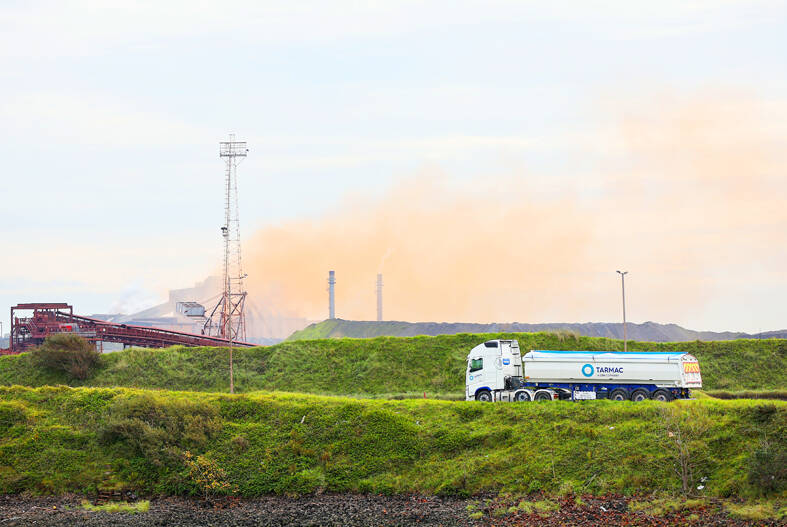The British government yesterday said that it would implement a new import carbon pricing mechanism by 2027, with goods imported from countries with a lower or no carbon price having to pay a levy as part of decarbonization efforts.
The UK government said the carbon border adjustment mechanism (CBAM) would apply to carbon-intensive products in the iron, steel, aluminum, fertilizer, hydrogen, ceramics, glass and cement sectors.
The charge applied would depend on the amount of carbon emitted in the production of the imported good, and the gap between the carbon price applied in the country of origin — if any — and the carbon price faced by UK producers.

Photo: EPA-EFE, Adam Vaughan
“This levy will make sure carbon-intensive products from overseas — like steel and ceramics — face a comparable carbon price to those produced in the UK, so that our decarbonization efforts translate into reductions in global emissions,” British Chancellor of the Exchequer Jeremy Hunt said. “This should give UK industry the confidence to invest in decarbonization as the world transitions to net zero.”
The British government said it would help reduce the risk of “carbon leakage,” avoiding emissions being displaced to other countries due to them having a lower or no carbon price. The CBAM will work alongside the UK Emissions Trading Scheme, it added.
In September, the EU launched the first phase of a system to impose carbon dioxide emissions tariffs on imported steel, cement and other goods — the world’s first. It would not begin collecting any carbon dioxide emission charges at the border until 2026.
That planned tariff has caused disquiet among trading partners and at a recent forum, Chinse Special Envoy on Climate Change Xie Zhenhua (解振華) urged countries not to resort to unilateral measures such as the EU levy.
The UK Treasury said the design of its carbon border tax would be subject to further consultation next year, including the list of products in scope.

Intel Corp chief executive officer Lip-Bu Tan (陳立武) is expected to meet with Taiwanese suppliers next month in conjunction with the opening of the Computex Taipei trade show, supply chain sources said on Monday. The visit, the first for Tan to Taiwan since assuming his new post last month, would be aimed at enhancing Intel’s ties with suppliers in Taiwan as he attempts to help turn around the struggling US chipmaker, the sources said. Tan is to hold a banquet to celebrate Intel’s 40-year presence in Taiwan before Computex opens on May 20 and invite dozens of Taiwanese suppliers to exchange views

Application-specific integrated circuit designer Faraday Technology Corp (智原) yesterday said that although revenue this quarter would decline 30 percent from last quarter, it retained its full-year forecast of revenue growth of 100 percent. The company attributed the quarterly drop to a slowdown in customers’ production of chips using Faraday’s advanced packaging technology. The company is still confident about its revenue growth this year, given its strong “design-win” — or the projects it won to help customers design their chips, Faraday president Steve Wang (王國雍) told an online earnings conference. “The design-win this year is better than we expected. We believe we will win

Quanta Computer Inc (廣達) chairman Barry Lam (林百里) is expected to share his views about the artificial intelligence (AI) industry’s prospects during his speech at the company’s 37th anniversary ceremony, as AI servers have become a new growth engine for the equipment manufacturing service provider. Lam’s speech is much anticipated, as Quanta has risen as one of the world’s major AI server suppliers. The company reported a 30 percent year-on-year growth in consolidated revenue to NT$1.41 trillion (US$43.35 billion) last year, thanks to fast-growing demand for servers, especially those with AI capabilities. The company told investors in November last year that

Power supply and electronic components maker Delta Electronics Inc (台達電) yesterday said it plans to ship its new 1 megawatt charging systems for electric trucks and buses in the first half of next year at the earliest. The new charging piles, which deliver up to 1 megawatt of charging power, are designed for heavy-duty electric vehicles, and support a maximum current of 1,500 amperes and output of 1,250 volts, Delta said in a news release. “If everything goes smoothly, we could begin shipping those new charging systems as early as in the first half of next year,” a company official said. The new